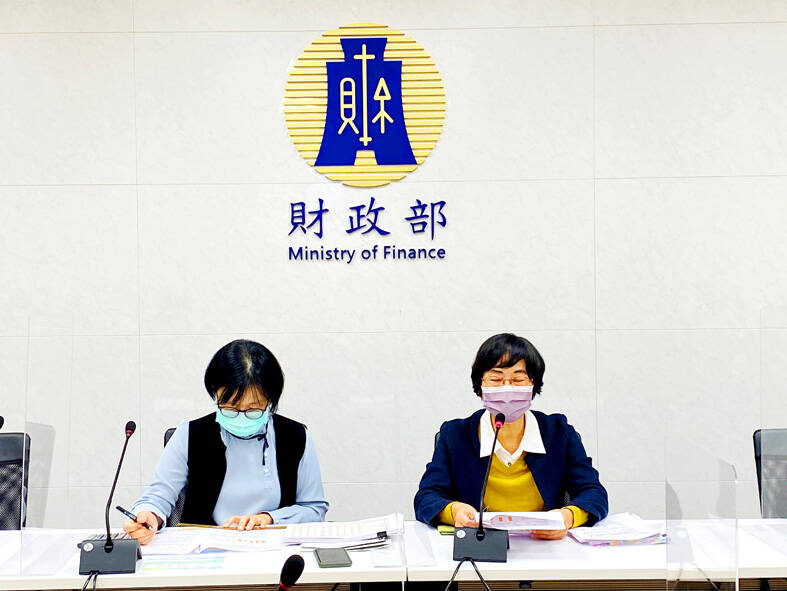The government last month collected NT$253.6 billion (US$8.28 billion) in tax revenue, rising 0.4 percent from a year earlier on the back of corporate and personal income tax, as well as inheritance tax gains, the Ministry of Finance said yesterday.
Corporate income tax revenue spiked 70.3 percent to NT$7.8 billion, while personal income tax revenue grew 2.6 percent to NT$22.9 billion, the ministry told a news conference in Taipei.
Despite an economic slowdown, Taiwanese firms gained headway in earnings, increased employee wages and distributed sizeable cash dividends to shareholders compared with a year earlier, Department of Statistics Deputy Director-General Chen Yu-feng (陳玉豐) said.

Photo: Clare Cheng, Taipei Times
Revenue from tariffs soared 24.8 percent to NT$13.8 billion, aided by an increase in imported vehicles and processed food, she said.
In addition, inheritance tax revenue swelled 60.8 percent to NT$4.1 billion, while revenue from business taxes picked up 4.5 percent to NT$97.8 billion, she said.
The impressive showings offset retreats in securities transaction and land value increase tax revenues, which plunged 41.7 percent and 31.8 percent to NT$13.9 billion and NT$6.5 billion respectively, the ministry’s monthly report showed.
Bleak sentiment caused by global inflation and monetary tightening continued to take a toll on the local bourse and property transactions, Chen said.
Revenue from sales taxes dropped 0.3 percent to NT$14.1 billion, attributable to tariff cuts on imported raw materials and commodities to ease inflationary pressures, it said.
Cumulative tax revenue in the first 11 months of the year rose 13.6 percent to NT$3.8 trillion, the first time the NT$3 trillion mark has been crossed in the period and exceeding the budget target for the whole year by 13 percent, the official said.
Full-year excess tax revenue might be more than NT$450 billion, Chen said, adding that corporate, personal, inheritance, business and house tax revenues have already set full-year records.
However, revenue from sales, land value gain and securities transaction taxes are likely to miss their targets, although the TAIEX recovered some losses this month, she said.

NEW IDENTITY: Known for its software, India has expanded into hardware, with its semiconductor industry growing from US$38bn in 2023 to US$45bn to US$50bn India on Saturday inaugurated its first semiconductor assembly and test facility, a milestone in the government’s push to reduce dependence on foreign chipmakers and stake a claim in a sector dominated by China. Indian Prime Minister Narendra Modi opened US firm Micron Technology Inc’s semiconductor assembly, test and packaging unit in his home state of Gujarat, hailing the “dawn of a new era” for India’s technology ambitions. “When young Indians look back in the future, they will see this decade as the turning point in our tech future,” Modi told the event, which was broadcast on his YouTube channel. The plant would convert

‘SEISMIC SHIFT’: The researcher forecast there would be about 1.1 billion mobile shipments this year, down from 1.26 billion the prior year and erasing years of gains The global smartphone market is expected to contract 12.9 percent this year due to the unprecedented memorychip shortage, marking “a crisis like no other,” researcher International Data Corp (IDC) said. The new forecast, a dramatic revision down from earlier estimates, gives the latest accounting of the ongoing memory crunch that is affecting every corner of the electronics industry. The demand for advanced memory to power artificial intelligence (AI) tasks has drained global supply until well into next year and jeopardizes the business model of many smartphone makers. IDC forecast about 1.1 billion mobile shipments this year, down from 1.26 billion the prior

People stand in a Pokemon store in Tokyo on Thursday. One of the world highest-grossing franchises is celebrated its 30th anniversary yesterday.

Zimbabwe’s ban on raw lithium exports is forcing Chinese miners to rethink their strategy, speeding up plans to process the metal locally instead of shipping it to China’s vast rechargeable battery industry. The country is Africa’s largest lithium producer and has one of the world’s largest reserves, according to the US Geological Survey (USGS). Zimbabwe already banned the export of lithium ore in 2022 and last year announced it would halt exports of lithium concentrates from January next year. However, on Wednesday it imposed the ban with immediate effect, leaving unclear what the lithium mining sector would do in the